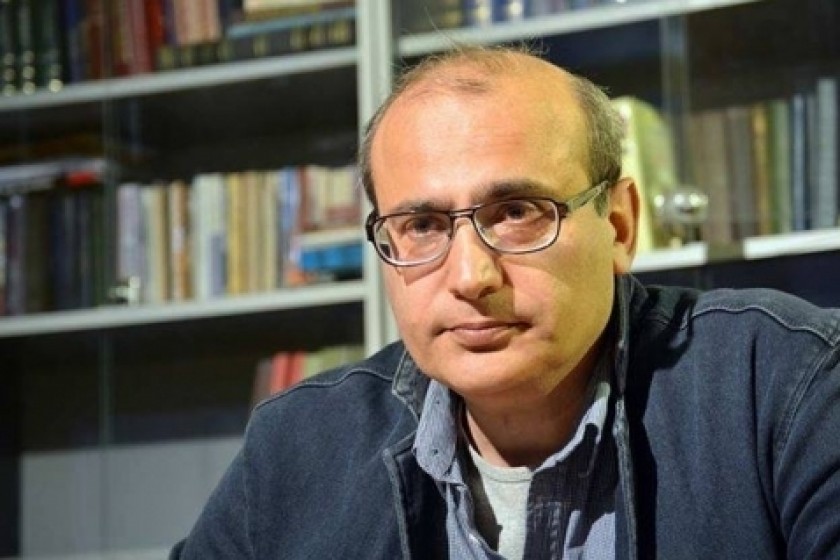
Political Analyst: "The fundamental issue isn't Karabakh, but that of regime change in the two countries"
An interview with political analyst Stepan Danielian
Today, people in Armenia are trying to understand the political underpinnings of the situation on the Artsakh frontline. Some believe that it is linked to the issue of Azerbaijan’s admission in the Eurasian Union. What do you believe?
It’s difficult to say what the specific reasons are. I find one other variant more understandable that isn’t talked about in the Armenian, Azerbaijani or Russian press.
Let’s take a more detailed look at the situation. In my view, twenty years of relative peace has resulted from a certain balance among the players possessing regional influence, and the lack of active competition amongst them. This was also the reason for a certain domestic political stability.
The Aliyev clan retained power in Azerbaijan, while authority in Armenia changed through elections. Here, the quality of these elections isn’t important. All foreign powers assisted such elections, because the concern was that the existing balance could be damaged with an “unpredictable” coming to power.
The authorities, both in Armenia and Azerbaijan, also desired balanced relations with the West and Russia. Iran, in turn, was in a deep defensive mode. It’s not by accident that many viewed the activities of the Minsk Group as a tool to freeze the Karabakh issue. The potential for regime change in these countries {Armenia and Azerbaijan} was also frozen.
The situation has now changed. Russia and the West have been drawn into a cycle of heady antagonism. Iran has recharged its foreign policy. In these conditions, the actions of the Minsk Group can have exactly the opposite role. That’s to say, rather than remaining a tool to freeze the conflict, the Minsk Group may become a mechanism to destabilize the conflict. It’s not by accident that the American and French co-chairs are openly declaring that the status-quo can no longer continue.
Here, particular focus must be directed to the fact that this status-quo not only refers to the conflict, but firstly to the regimes now in power. In my estimation, this is where the problem lies. It’s not by chance that arrests of human rights defenders have begun in Azerbaijan, and that they are being labeled Western spies and organizers of ‘colored revolutions’.
Of note is the arrest and sentencing to life of two Iranian ‘spies’ in Azerbaijan. However, they do not arrest Russian ‘spies’. I believe that Aliyev is deeply concerned about retaining power. The status-quo needed to retain power no longer works. Aliyev needs the protection of Russia.
Now, let’s look at why the situation on the ground on the borders has destabilized.
Those who follow events know that a meeting of Sargsyan and Aliyev is expected in Paris. The Americans, however, want to change the venue to New York. It is assumed that stark and specific demands are to be made regarding the Karabakh issue and that the possibility of deploying western peacekeeping troops is to follow. By the way, a portion of American troops being pulled out of Afghanistan will return to the U.S. via Azerbaijan. It’s possible that they might change their minds and remain in Azerbaijan. It’s possible that this is a cause of the instability taking place in Karabakh. That’s to say, such a situation had to be created in which the necessity arose to quickly change the venue of the Sargsyan-Aliyev meeting to Sochi.
Again, the fundamental issue isn’t Karabakh, but that of regime change in the two countries. Given the change in the situation on the ground, the time has come for the decaying regimes to give way to more dynamic forces.
What can the meeting between the presidents of Armenia and Azerbaijan, scheduled for August 8 in Sochi, offer the two countries?
The question is harder to answer than the first.
Recently, the unofficial Kremlin spokesperson, Vladimir Zhirinovsky, declared that the issue of war and peace was being resolved in the office of the Russian president. This is the main message directed at the West. The other mediators, according to Zhirinovsky, must accept this. Whatever leverage the West has on Armenia and Azerbaijan is a topic of discussion.
I believe that the main target is Azerbaijan. Greater activity by the Islamists in Azerbaijan in the near future can’t be ruled out. Public demonstrations, backed by state officials and businessmen with business ties to the West, are a possibility. Generations in Azerbaijan have been raised on state sponsored propaganda, and it will be difficult to suddenly alter the foreign policy course. Drastic changes within the ruling circles cannot be ruled out, especially in the security and law enforcement sectors. Further arrests are a possibility.
There might also be a drastic cooling of Relations between Azerbaijan and Turkey. Serious clashes with Armenia at this time might be dangerous for Azerbaijan.
The many years of nationalist and anti-Armenian rhetoric in Azerbaijan can now turn into a source of trouble for Aliyev.
 Videos
Videos Photos
Photos




Write a comment